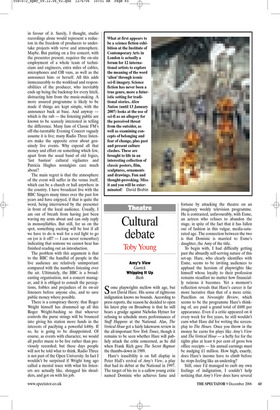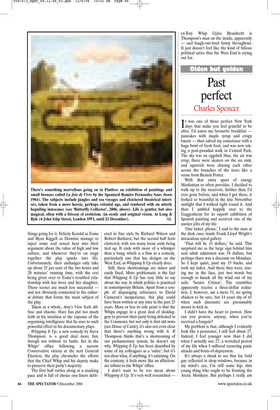Cultural debate
Toby Young
Amy’s View Garrick Whipping It Up Bush Some playwrights mellow with age, but not David Hare. His sense of righteous indignation knows no bounds. According to press reports, the reason he decided to open his latest play on Broadway is that he still bears a grudge against Nicholas Hytner for refusing to schedule more performances of Stuff Happens at the National. Alas, The Vertical Hour got a fairly lukewarm review in the all-important New York Times, though it remains to be seen whether Hare will publicly attack the critic concerned, as he did when Frank Rich gave The Secret Rapture the thumbs-down in 1989.
Hare’s irascibility is on full display in Peter Hall’s revival of Amy’s View, a play that had its debut at the National in 1997. The target of his ire is a callow young critic named Dominic who achieves fame and fortune by attacking the theatre on an imaginary weekly television programme. He is contrasted, unfavourably, with Esme, an actress who refuses to abandon the stage, in spite of the fact that it has fallen out of fashion in this vulgar, media-saturated age. The connection between the two is that Dominic is married to Esme’s daughter, the Amy of the title.
To begin with, I had difficulty getting past the absurdly self-serving nature of this set-up. Hare, who clearly identifies with Esme, seems to be inviting audiences to applaud the heroism of playwrights like himself whose loyalty to their profession remains steadfast no matter how financially ruinous it becomes. Yet a moment’s reflection reveals that Hare’s career is far more lucrative than that of a mere critic. Panellists on Newsnight Review, which seems to be the programme Hare’s thinking of, are paid a grand total of £600 per appearance. Even if a critic appeared on it every week for five years, he still wouldn’t earn what Hare did for writing the screenplay to The Hours. Once you throw in the money he earns for plays like Amy’s View and The Vertical Hour — a hefty fee for the rights plus at least 6 per cent of gross box office receipts — his annual earnings must be nudging £1 million. How high, exactly, does Hare’s income have to climb before he stops feeling like an underdog?
Still, once I’d managed to curb my own feelings of indignation, I couldn’t help noticing that Amy’s View does have several things going for it. Felicity Kendal as Esme and Ryan Kiggell as Dominic manage to inject some real sexual heat into their argument about the value of high and low culture, and whenever they’re on stage together the play sparks into life. Unfortunately, their exchanges only take up about 25 per cent of the two hours and 20 minutes’ running time, with the rest being given over to Esme’s troubled relationship with her lover and her daughter. These scenes are much less successful and not obviously connected to the cultural debate that forms the main subject of the play.
Taken as a whole, Amy’s View feels diffuse and chaotic. Hare has put too much faith in his intuition at the expense of the organising intelligence that he uses to such powerful effect in his documentary plays.
Whipping It Up, a new comedy by Steve Thompson, is a good deal more fun, though not without its faults. Set in the Whips’ office following a narrow Conservative victory at the next General Election, the play chronicles the efforts that the Chief Whip and his deputy make to preserve their party’s majority.
The first half rattles along at a cracking pace and is full of choice one-liners deliv ered in fine style by Richard Wilson and Robert Bathurst, but the second half feels cluttered, with too many loose ends being tied up. It ends with more of a whimper than a bang, which is a flaw in a comedy, particularly one that has designs on the West End, as Whipping It Up clearly does.
Still, these shortcomings are minor and easily fixed. More problematic is the fact that Whipping It Up has very little to say about the way in which politics is practised in contemporary Britain. Apart from a couple of disparaging references to David Cameron’s inexperience, this play could have been written at any time in the past 25 years. More or less its sole point is that the Whips engage in a great deal of skulduggery to prevent their party being defeated in the Commons, but not only is that old news (see House of Cards), it’s also not even clear that there’s anything wrong with it. If Thompson thinks that’s a shortcoming of our parliamentary system, he doesn’t say why. Whipping It Up has been described by some of my colleagues as a ‘satire’, but it’s not clear what, if anything, it’s satirising. On the contrary, it feels more like an affectionate tribute to the Whips’ office.
I don’t want to be too mean about Whipping It Up. It’s very well researched — ex-Tory Whip Gyles Brandreth is Thompson’s man on the inside, apparently — and laugh-out-loud funny throughout. It just doesn’t feel like the kind of bilious political satire that the West End is crying out for.



























































































 Previous page
Previous page